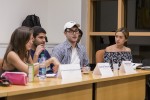The first coalition of international student leaders at UCLA held its inaugural meeting Monday evening.
The International Student Leadership Coalition consists of leaders from 16 cultural groups and aims to provide a voice for international students, said Jack Guo, the coalition’s organizational chair. At its first meeting, the coalition discussed ways to coordinate programs and advocate for the international student community.
Guo formally introduced the idea of creating the coalition in a meeting between Dashew Center administrators and student leaders last month.
[Related: USAC, Dashew Center discuss creation of international student committee]
Guo, who is also the director of the the undergraduate student government president’s Committee of International Relations, said his committee has reached out to several cultural organizations over the past few months to discuss creating the coalition. The organizations that displayed the most interest in the concept joined the coalition, Guo said.
Guo added the coalition will pool resources and increase communication between different groups to collaborate on solutions to issues that affect all international students, such as integrating into American culture and issues with employment visas.
“We are representing (about) one-eighth of the undergraduate population,” he said. “This is the first time so many of these groups are coming together.”
During the meeting, the coalition created a subcommittee to focus on policy issues that affect international students and appointed a social chair to promote international student events and increase outreach.
Ung Lik Teng, a board member of the Malaysian Students Association, said he thinks the coalition’s policy subcommittee could play an important advocacy role in light of President Donald Trump’s travel ban. The ban affects citizens of several Muslim-majority countries. A federal judge froze this new travel ban Wednesday.
“The current political climate is unfriendly for international students. It is kind of very uncertain for us now,” Teng said. “Our individual communities are very small, but if we all get together we are very strong.”
For example, the coalition could work with the USAC External Vice President’s office to lobby state and federal officials on bills that affect international students, such as restrictions on the H1-B visa, he said.
[Related: International graduate students discuss career concerns under Trump]
Ashraf Beshay, president of the United Arab Society, said he thinks the coalition should advocate against the University of California’s proposed cap on nonresident students.
“We need to make the regents understand how the rising costs of a UC education affect students like us,” he added.
The coalition also discussed how to engage international students.
Guo said the coalition’s social chair will communicate with the different organizations in the coalition to promote their events through social media and campus flyering.
“A huge part of the international student community is not part of any organization, so we need to make sure that they don’t feel left out,” Guo said.
The social chair, Ahlim Lee, a second-year political science and French student, said she plans to organize events to bring different communities together and work closely with cultural groups to get more students to attend their events. Lee also works in the Dashew Center as a staff assistant.
Amy Pojar, the Dashew Center’s assistant director of research and special projects also attended the meeting and said she will see if the center can promote student groups’ events on its mobile app.
Some student leaders who attended the meeting said they think the coalition will help their groups come closer together.
Jaewoo Lee, a board member from the Korean Student Union, said he thinks cultural groups tend to focus solely on their communities, and the coalition can help these groups work on issues more broadly.
Transfer Student Representative Divya Sharma said he thinks the coalition can help international groups overcome obstacles.
“The idea of a coalition is beautiful,” he said. “It allows us to come together and make sure the obstacle is being seen through different sides.”

Sadly, Trump’s contentious issue is yet one more thing that makes being an international student difficult, on top of our already complex culture and language. Assimilation assistance must come from numerous sources to aid these young people embarking on their life’s journey. Most struggle in their efforts and need guidance from schools’ international departments, immigration protection, host families, concerned neighbors and fellow students, and even informative books to extend a cultural helping hand so we all have a win-win situation.
An award-winning worldwide book/ebook that reaches out to help anyone coming to the US is “What Foreigners Need To Know About America From A To Z: How to Understand Crazy American Culture, People, Government, Business, Language and More.” It is used in foreign Fulbright student programs and endorsed worldwide by ambassadors, educators, and editors. It also identifies “foreigners” who became successful in the US and how they’ve contributed to our society, including students.
A chapter on education explains how to be accepted to an American university and cope with a confusing new culture, friendship process and daunting classroom differences. Some stay after graduation. It has chapters that explain how US businesses operate and how to get a job (which differs from most countries), a must for those who want to work with/for an American firm here or overseas.
It also has chapters that identify the most common English grammar and speech problems foreigners have and tips for easily overcoming them, the number one stumbling block they say they have to succeeding here.
Good luck to all at UCLA or wherever you study or wherever you come from, because that is the TRUE spirit of the American PEOPLE, not a few in government who have the loudest voice!